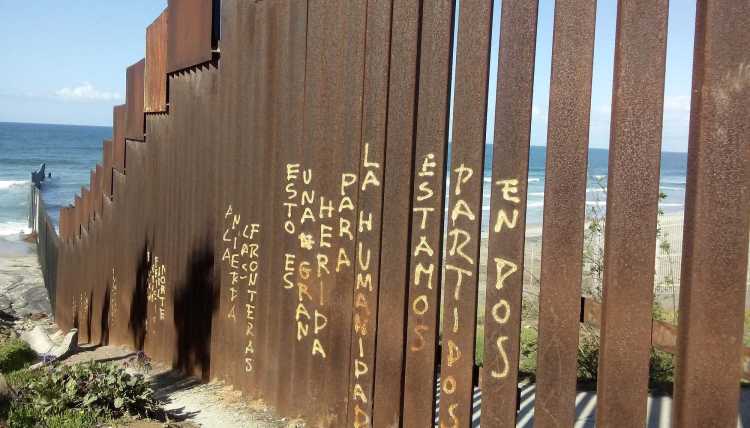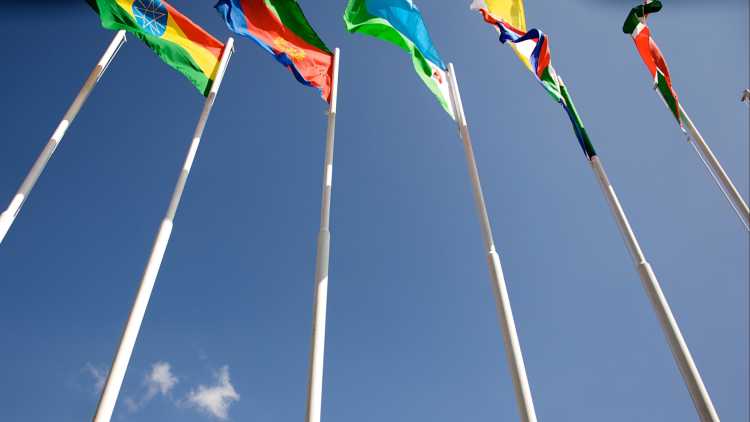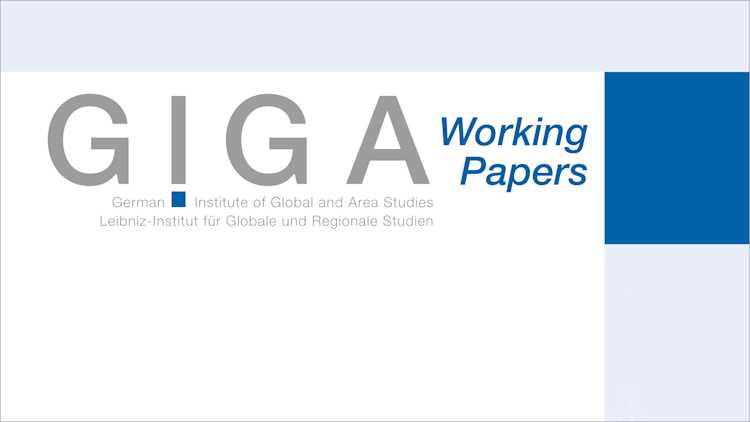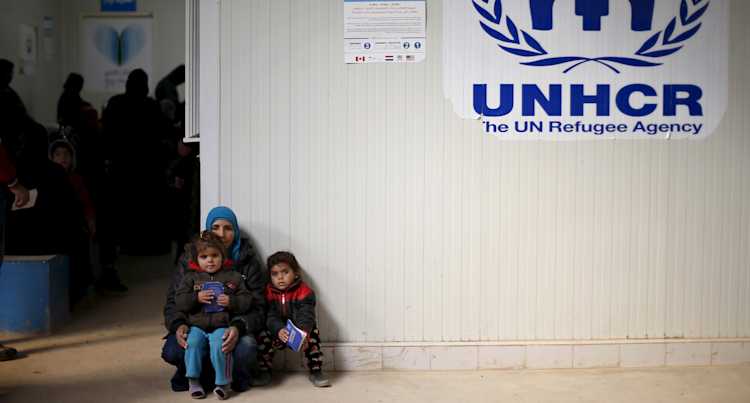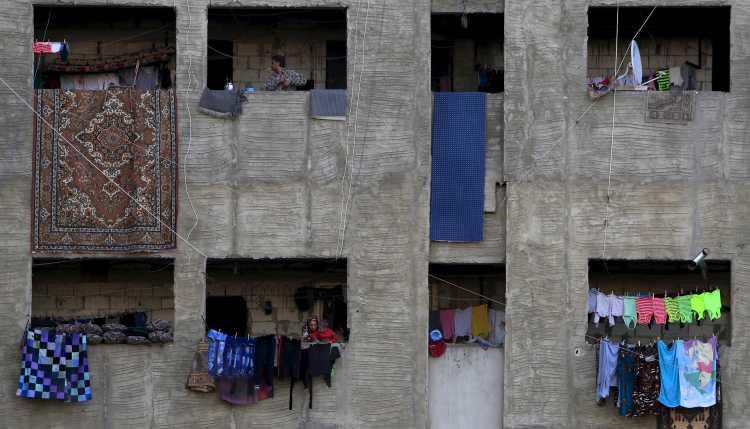- Home
- Publications
- GIGA Focus
- Eritrean Refugees: The Pawns of European Interests
GIGA Focus Africa
Eritrean Refugees: The Pawns of European Interests
Number 2 | 2016 | ISSN: 1862-3603
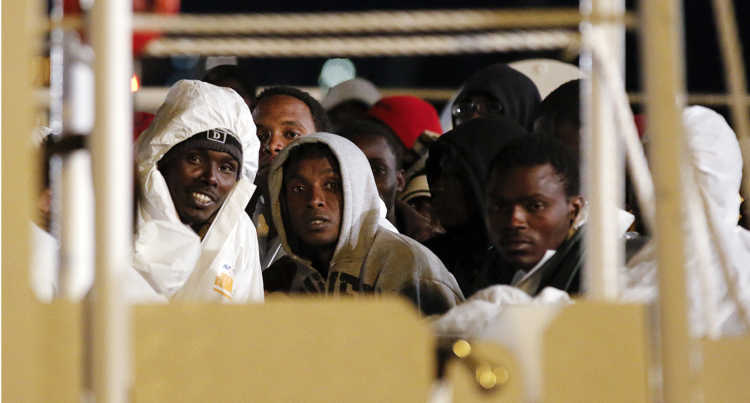
During the past decade, hundreds of thousands of Eritreans have fled to neighbouring countries to evade the state-prescribed forced labour of the indefinite national service. Now the EU is attempting to keep these people away from Europe by providing significant funding to the Eritrean and Sudanese regimes. The plans developed to date are not working towards an improvement in the living conditions of those affected, but rather towards increased repression.
Since the implementation of the indefinite national service in 2002, hundreds of thousands of working-age Eritreans have been performing military and civil services for the state, for minimal pay. This system of organised forced labour has led to massive human flight and the development of organised human smuggling.
Since 2014, tens of thousands of Eritreans have managed to reach Europe via Libya. The majority of those who have fled, however, live in neighbouring Ethiopia and Sudan, often in precarious conditions. They live in fear of falling prey to human-trafficking gangs or being deported back to their home country, where they face imprisonment without trial because their flight is viewed as treason.
Through the Khartoum Process, the EU is attempting to stem the flow of refugees to Europe. As part of this process, the Sudanese military and police forces are to be given support to capture and intern refugees.
At the same time, the EU has resumed development cooperation with Eritrea and has pledged EUR 200 million for the expansion of the energy sector and to support improved governance. This assistance is not tied to conditions.
Policy Implications
The courting of autocratic regimes is not an effective strategy for combating the causes of refugee flight. Instead, development assistance should be tied to conditions and should require and support comprehensive reforms. These include, first and foremost, the shortening of the national service, which is the main cause of flight; the liberalisation of the Eritrean command economy; and the development of rule-of-law structures.
Indefinite National Service, Forced Labour, and a Mass Exodus
Shortly after Eritrea’s independence from Ethiopia in 1993, the Eritrean government, which had emerged from the Eritrean People’s Liberation Front, implemented an 18-month military and national service. It was intended, on the one hand, to assist in reconstructing the country after 30 years of a liberation war and, on the other, to transmit the fighters’ Maoist ideology to the younger generation. Shortly afterwards, from 1998 to 2000, another devastating war with Ethiopia took place. Two years later an international court of arbitration, the Eritrea-Ethiopia Boundary Commission (EEBC), granted parts of the disputed border area to Eritrea; Ethiopia has refused to this day to implement the verdict. In response, Eritrea spoke of a state of “cold peace” and in 2002 extended the national service to an indefinite term. Since then, men have been required to work from age 18 to at least age 50 for companies belonging to the military or the party, earning only an allowance; the same requirement applies to women up to age 27. Depending on their qualifications, individuals are put to work performing manual tasks in construction and agriculture, in the administration, or as teachers and medical personnel. The government determines the location, meaning that families are often permanently torn apart. The prospect of a life of serfdom that doesn’t allow the labourers to feed their families has led to a mass exodus (Hirt und Mohammad 2013; Kibreab 2014). According to UNHCR figures, 5,000 primarily young people currently flee over the borders each month – despite orders to shoot – to Ethiopia or Sudan or across the Red Sea to the Arabian Peninsula.
Stopovers on the Refugees’ Escape Route
European interest in Eritrea and the causes of human flight from the country increased significantly in 2014, when, according to the UNHCR, 37,000 Eritrean refugees managed to reach Europe – a massive increase over the 13,000 Eritreans seeking asylum in 2013. In 2015, approximately 40,000 Eritreans arrived via the Mediterranean, making the small country with a population of approximately four million the largest “producer of refugees” in Africa. What is often forgotten, though, is that the majority of those who flee remain in neighbouring Sudan and Ethiopia: 130,000 and 125,000 UNHCR-registered Eritreans live in the two countries, respectively, including a significant share of unaccompanied minors. The number of non-registered cases is much higher, particularly in Sudan. In Ethiopia most refugees live in precarious conditions in camps in the border provinces Tigray and Afar. They are provided with a rudimentary amount of food, but the camps offer absolutely no employment prospects. A minority of people who have relatives in the country provide for themselves, and some Eritreans even study at Ethiopian universities. The majority, however, wait (mostly unsuccessfully) to be accepted in an industrialised country through the UNHCR’s resettlement programme, or they set off in the direction of Europe.
In Sudan the living conditions in the camps are similarly lacking in prospects, which is why the majority of arrivals attempt to continue on to Khartoum, where Eritreans can find work relatively easy through the diaspora established there since the liberation war. With their savings, they pay smugglers who promise to help them make their way through Libya, and more recently Egypt, to Europe. All around the refugee camps and in the Sudanese capital, a human-smuggling and human-trafficking industry, in which both Eritrean and Sudanese officials are involved, is flourishing (Van Reisen, Estefanos, and Rijken 2014). Between 2009 and 2012, 10,000 Eritrean refugees attempted to reach Israel over the Egyptian Sinai Peninsula, falling into the hands of unscrupulous Bedouins, who tortured them in order to blackmail relatives in the diaspora; in recent years, however, the escape route has shifted back to Libya, where human traffickers and smugglers also carry out their questionable deals (SAHAN/IGAD 2016).
Between Fear and Hope
The dangers of travelling to Europe are well known. Thousands of Eritreans, including pregnant women and newborns, have died in recent years after their boats have capsized. In the last week of May 2016 alone, approximately 880 people drowned (UNHCR 2016), many of them from Eritrea. Nevertheless, many Eritreans dream of an onward journey to Europe. On the one hand, they are in touch with friends and relatives who have either lived there for years or have only recently arrived and who frequently talk up their situation, creating a pull effect. On the other hand, many of those stranded in Eritrea’s neighbour countries are not only afraid of the lacking prospects of life in the refugee camp but also justifiably fear being kidnapped in the camps by human traffickers and sold to criminal gangs – though the danger of falling into the hands of such groups, particularly in the failed state of Libya, also exists during flight (SAHAN/IGAD 2016).
In Sudan, where the government maintains close relations with Eritrean dictator Isaias Afewerki, many Eritreans live in perpetual fear of being picked up by agents of their government and deported to Eritrea (Treiber 2013). In the past it was primarily government opponents or former officials of the Eritrean regime who were impacted by such actions; more recently, however, actual raids have taken place. At the end of May 2016, Sudanese soldiers apprehended 900 Eritreans in Khartoum and 400 who were on their way to Libya. The smugglers’ attempts to bribe – as usual – the security forces involved did not succeed. The refugees were arrested and then, according to eyewitness reports, loaded into trucks with the help of the Eritrean embassy and deported to Eritrea, where they were brought to a prison (IRIN 2016; Sudan Tribune 2016). Illegally crossing the border to escape the national service is considered treason in Eritrea. Those captured in the act are not provided with any legal process; rather, they are usually kept prisoner in detention camps for months, before being reassigned to the national service.
The question thus arises as to why the Sudanese government, which is otherwise relatively lax when it comes to human smuggling, is suddenly taking such measures. Sudanese government employees – especially in the eastern provinces (Kassala and Al-Bahr Al-Ahmar), which cooperate closely with the Eritrean regime, and in Khartoum – are often involved in human trafficking themselves or profit indirectly from bribes. It is likely that the most recent anti-refugee raids are connected to the proposed European aid for containing the flow of refugees.
The EU and the Khartoum Process: Complicity with Those Causing Refugees to Flee?
Given the increasing number of refugees from Eritrea and other African countries, the EU made the decision in fall 2014 to cooperate with autocratic or highly authoritarian regimes such as those in Eritrea, Sudan, and Ethiopia as part of the Khartoum Process in order to limit illegal migration and human trafficking. The aim is to prevent refugees from embarking on the onward journey to Europe. Among other things, these countries’ border protection is to be improved and their institutions strengthened in order to prevent migration streams. With the vague promise of wanting to combat the wave of refugees from its own country, the Eritrean government also managed to obtain a pledge of over EUR 200 million in development assistance from the EU, which is not conditional upon democratic reforms or the reform of the national service. According to reports from the Spiegel and Report Mainz, the EU Commission plans to deliver border monitoring equipment such as cameras and scanners to Sudan via the German Agency for International Development Cooperation (GIZ) in order to aid in the registration of refugees and to train border personnel (Spiegel Online 2016). The apparent aim is to make it impossible or more difficult for refugees from Eritrea, who have managed to cross their country’s borders despite orders to shoot, to make the onward journey via Sudan to Europe. What is noteworthy is that even the EU representatives involved were apparently not convinced of the value of such measures, since, according to the Spiegel, they wanted to prevent the outcome of their discussions from being made public at all costs.
Theoretically, the EU and the German government are in agreement that in order to limit migration to Europe, the focus should be on fighting the root causes of human flight. It is also clear within the EU that refugees’ flight from Eritrea is primarily caused by the indefinite national service; the denial of political, economic, and social rights; and the absence of private-sector employment opportunities (GSDRC 2016: 1). Against this backdrop, it seems strange that the Khartoum Process is aiming to improve living conditions in the refugee camps only in a very limited manner and that new camps with prison cells are being planned instead (Spiegel Online 2016). What is also questionable is that Sudanese president Al-Bashir, who has been accused by the International Criminal Court of crimes against humanity, is being given funds to strengthen his security forces. At the same time, the EU is promising unconditional development aid to Eritrean president Isaias Afewerki, who is suspected of having committed similar crimes by a UN human rights commission. Independent NGOs able to implement projects without being under state control are forbidden in Eritrea, and the allocation of funds by the government is completely non-transparent: in 25 years of independence not a single state budget has been published.
Europe as a Pawn of the Eritrean Regime
Europe’s Eritrea policy has long been characterised by inconsistency and a willingness to allow the Eritrean regime to lead Europe around by the nose: In 1997 the Eritrean government unilaterally ended its cooperation with bilateral European funders, citing its self-reliant development strategy, only to call them back in 2001 after the war with Ethiopia. In the same year, the country underwent a political crisis. The president had 11 high-ranking members of the ruling party arrested after they had called for political reforms and the curbing of his absolute power, and he rejected the implementation of the constitution, which had been ratified in 1997, and future democratisation processes.
The journalists of the free press also met the same fate: Like the reformers, they were held for years in solitary confinement without trial; most of them are considered to have died by now given the miserable conditions of their imprisonment. Following the wave of arrests, then Italian ambassador Bandini complained to President Isaias in the name of the EU and was promptly expelled from the country. The remaining EU representatives were initially recalled, but they soon returned to Asmara, without protesting further against the regime’s grievous human rights violations. In 2005, virtually all bilateral funders and international NGOs were again expelled from the country. Nevertheless, the EU unhesitatingly sought rapprochement through dialogue as of 2007. Using this approach, the then EU development commissioner Louis Michel sought unsuccessfully to secure the release of the Swedish-Eritrean journalist Dawit Issak. In 2009, the EU granted the Eritrean government EUR 122 million in development assistance, of which 34 million went to road construction. Since 2006, all construction companies have been in the possession of the ruling party and have systematically used national service recruits as forced labour. The EU thus essentially gave the Eritrean regime carte blanche to carry out its forced militarisation policy.
In 2011, the Eritrean government decided to return the remaining EU funds and to terminate cooperation for the time being – probably because it was in this year that gold mining began in the country. Yet in 2014 Eritrea’s leadership again demonstrated openness to various European delegations, which travelled to the country and offered funding for training programmes, demanding that the government curb the flow of migrants in return. In December 2015, as part of the 11th European Development Fund, the EU pledged EUR 200 million, which are to go to the energy sector and to support improved governance. Even the German minister for development and cooperation, Dr. Gerd Müller, travelled to President Isaias to discuss the resumption of cooperation (Deutsche Botschaft Asmara 2015).
No End to the Indefinite National Service in Sight
In 2015, presidential advisor Yemane Gebreab repeatedly promised foreign delegations that the national service would be limited to 18 months for the most recent round of recruits. This promise has now been reversed in talks with a Swiss–German mission, which responded with disappointment (Swissinfo.ch 2016). This disappointment reflects the misjudgement of European policymakers regarding the actual extent of the national service. Following the end of the Eritrean–Ethiopian war, the World Bank funded a USD 200 million demobilisation and reintegration programme for the then approximately 250,000 soldiers of the Eritrean army, with the goal of making it possible for them to live a civilian life. This programme was halted abruptly one year later, and since then 20,000 young people have been recruited annually. According to government reports, by 2015 a total of half a million Eritreans had successfully completed the Sawa military camp, which functions both as a boarding school and as the starting point for the national service. Since 2002, only married women have been demobilised. Men typically undertake decades of service in the military or performing civil duties. The only alternative is to flee the country.
The number of people currently serving in the national service is likely at least 300,000 – from a population of approximately four million. To reintegrate these people into the private sector through a demobilisation programme would require not only a carefully developed strategy but also readiness on the part of the government to liberalise the economy, to allow private initiatives, and to loosen its rigid control over all areas of public life. The regime justifies the forced militarisation of the entire society (Hirt and Mohammad 2013) with the ongoing threat posed by Ethiopia and the inability of the international community to move the neighbour country to implement the EEBC border decision. It is correct that the international pressure on Ethiopia is limited; the country is held in high regard as a haven of stability within the volatile Horn of Africa. However, the mass recruiting of Eritreans to the army and to forced state service does not contribute in any way to their willingness to defend the country. For this purpose, a professional, well-trained, and paid career army would make far more sense. The chosen strategy can be interpreted much more as the country’s lapse back to the pre-state mode of the independence struggle. Rather than enjoying the fruits of independence, the people should, now as then, patriotically and without pay, sacrifice themselves for the nation; however, they are choosing to flee instead. In 2000, following the end of the Eritrean–Ethiopian war, it was decided in the Algiers Peace Agreement to transfer the decision regarding the delimitation of the border to an international commission. As one of the guarantors of the agreement, the EU has a duty to pressure Ethiopia to implement the 2002 decision on the border, which is binding under international law. In doing so, it would deprive the Eritrean government of the ideological justification for its policies.
Also noteworthy is that Eritrea’s political leadership has been consciously tolerating the mass exodus for some time – in contradiction of its own rhetoric – because it contributes to domestic stability: On the one hand, it serves as an outlet for the frustrated youth, who seek their salvation in flight rather than resistance; on the other, the government requires Eritreans living overseas to pay a diaspora tax of 2 per cent of their income, which together with other donations and charges makes up approximately one-third of the state budget (Hirt 2015: 125). At least equally important are private money transfers from Eritreans abroad to relatives still in the country who are prevented from earning a living due to the national service. The regime thus profits indirectly from the exodus of the population and has ingenious transnational structures at its disposal to keep the diaspora in check. It is not facing – we should be clear about this – imminent collapse and is thus also not willing to make reforms.
Possible Alternatives: What Can Europe Do?
The Khartoum Process and European politicians’ political courting of the Eritrean government will not lead to political reforms; rather, it will further strengthen the political elite. Over the years, the regime has learned how to exploit the EU’s readiness to engage in dialogue to its own material advantage, without ever having been prepared to make concessions in the areas of democracy or human rights. Europe’s current strategy of on the one hand unconditionally allocating Eritrea money from the 11th Development Fund, the use of which will not have any impact on the causes of human flight, and simultaneously investing money in the Sudanese security sector to register and, as a precaution, intern refugees whom Germany is currently recognising as being entitled to asylum without reservation can only be described as cynical.
What is required to combat the well-known causes of human migration is, instead, clear demands from the EU and assistance that is tied to conditions:
The reform of the indefinite national service as part of a demobilisation programme, which would require significant financial resources.
The liberalisation of the command economy, which is currently controlled by the governing party and the military.
Democratic reforms and the establishment of the rule-of-law.
It is to be expected that the Eritrean president, despite sporadic lip service, will not be willing to undertake such reforms. For this reason, a consistent policy that makes financial support conditional upon a concrete reform programme is necessary.
The goal of the Khartoum Process and similar programmes should not be a restrictive course of action against refugees but rather the improvement of their living conditions on-site in the neighbouring countries.
Footnotes
References
Deutsche Botschaft Asmara (2016), Bundesminister Dr. Gerd Müller in Eritrea, 15 December, www.asmara.diplo.de/Vertretung/asmara/de/02/Veranstaltungen/BM_20Mueller_20in_20Eritrea.html (3 June 2016).
GSDRC (2016), Rapid Fragility and Migration Assessment for Eritrea (Rapid Literature Review), University of Birmingham, prepared for the European Commission’s Instrument Contributing to Stability and Peace.
Hirt, Nicole (2015), The Eritrean Diaspora and its Impact on Regime Stability: Responses to UN Sanctions, in: African Affairs, 114, 454, 115-135.
Hirt, Nicole, and Abdulkader Saleh Mohammad (2013), ‘Dreams Don’t Come True in Eritrea’: Anomie and Family Disintegration due to the Structural Militarisation of Society, in: Journal of Modern African Studies, 51, 1, 139-168.
IRIN (2016), Sudan and Eritrea Crack down on Migrants amid Reports of EU Incentives, 25 May, www.irinnews.org/news/2016/05/25/sudan-and-eritrea-crackdown-migrants-amid-reports-eu-incentives (26 May 2016).
Kibreab, Gaim (2014), The Open-Ended Eritrean National Service: The Driver of Forced Migration, paper for the European Asylum Support Office, www.ecoi.net/file_upload/90_1416473628_gaim-kibreab-the-open-ended-eritrean-national-service-the-driver-of-forced-migration.pdf (12 April 2016).
SAHAN/IGAD (2016), Human Trafficking and Smuggling on the Horn of Africa-Central Mediterranean Route, http://igad.int/attachments/1284_ISSP%20Sahan%20HST%20Report%20%2018ii2016%20FINAL%20FINAL.pdf (3 June 2016).
Spiegel Online (2016), Questionable Deal: EU to Work with African Despot to Keep Refugees out, 13. Mai, www.spiegel.de/international/world/eu-to-work-with-despot-in-sudan-to-keep-refugees-out-a-1092328.html (31 May 2016).
Sudan Tribune (2016), UNHCR Urges Sudan to Halt Forcibly Deporting Eritreans, 3 June, www.sudantribune.com/spip.php?article59178= (4 June 2016).
Swissinfo.ch (2016), Official Trip Finds Few Rights Improvements in Eritrea, 9 May, www.swissinfo.ch/eng/fact-finding-mission_official-trip-finds-few-rights-improvements-in-eritrea-/42141642 (12 May 2016).
Treiber, Magnus (2013), Grasping Kiflu’s Fear: Informality and Existentialism in Migration from North-East Africa, https://edu.uhk.cz/africa/index.php/ModAfr/article/view/135 (10 October 2014).
UNHCR (2016), Mediterranean Death Toll Soars in First 5 Months of 2016, 31 May, https://www.unhcr.org/news/latest/2016/5/574db9d94/mediterranean-death-toll-soars-first-5-months-2016.html (3 June 2016).
Van Reisen, Mirjam, Meron Estefanos, and Conny Rijken (2014), The Human Trafficking Cycle: Sinai and beyond, Oisterwijk, Netherlands: Wolf Publications.
General Editor GIGA Focus
Editor GIGA Focus Africa
Editorial Department GIGA Focus Africa
Regional Institutes
Research Programmes
How to cite this article
Hirt, Nicole (2016), Eritrean Refugees: The Pawns of European Interests, GIGA Focus Africa, 2, Hamburg: German Institute for Global and Area Studies (GIGA), http://nbn-resolving.de/urn:nbn:de:0168-ssoar-47875-6
Imprint
The GIGA Focus is an Open Access publication and can be read on the Internet and downloaded free of charge at www.giga-hamburg.de/en/publications/giga-focus. According to the conditions of the Creative-Commons license Attribution-No Derivative Works 3.0, this publication may be freely duplicated, circulated, and made accessible to the public. The particular conditions include the correct indication of the initial publication as GIGA Focus and no changes in or abbreviation of texts.
The German Institute for Global and Area Studies (GIGA) – Leibniz-Institut für Globale und Regionale Studien in Hamburg publishes the Focus series on Africa, Asia, Latin America, the Middle East and global issues. The GIGA Focus is edited and published by the GIGA. The views and opinions expressed are solely those of the authors and do not necessarily reflect those of the institute. Authors alone are responsible for the content of their articles. GIGA and the authors cannot be held liable for any errors and omissions, or for any consequences arising from the use of the information provided.





